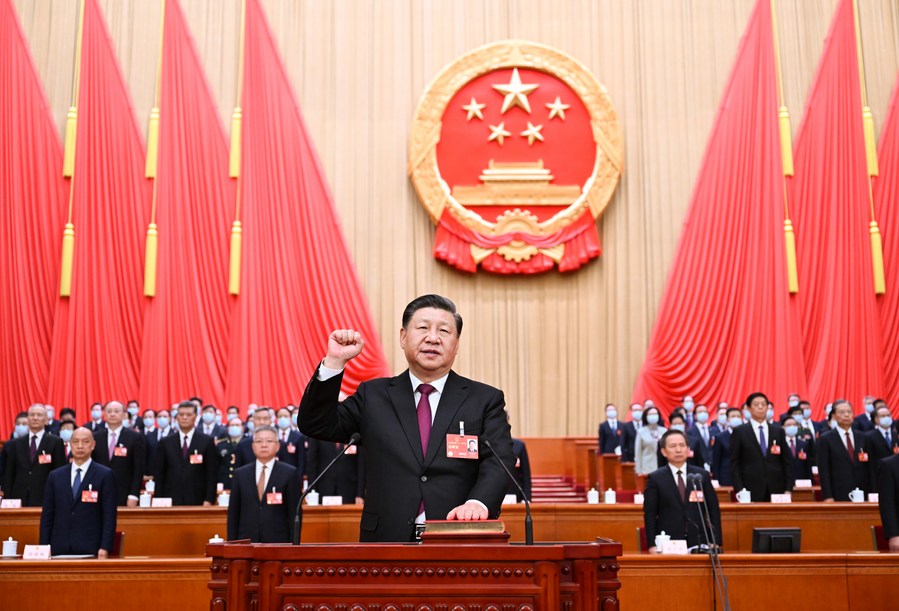Xi Jinping unanimously elected Chinese president, PRC CMC chairman

BEIJING -- Xi Jinping was unanimously elected Chinese president on Friday at the ongoing session of China's national legislature, leading the country of 1.4 billion people onto a new journey toward modernization.
He was also elected chairman of the Central Military Commission (CMC) of the People's Republic of China (PRC) by a unanimous vote.
A total of 2,952 deputies were present at the third plenary meeting of the first session of the 14th National People's Congress (NPC) on Friday morning, to exercise their constitutional right to elect China's state leadership.

Xi Jinping, Li Qiang, Zhao Leji, Wang Huning, Han Zheng, Cai Qi, Ding Xuexiang and Li Xi attended the meeting.
The elections began at 9:27 am, after lawmakers adopted a method on election and appointment for the first session of the 14th NPC.
The voting was anonymous.
Thunderous applause broke out across the Great Hall of the People when the results of the elections were pronounced.
Xi, donning a dark suit with a burgundy tie, rose from his seat and bowed to the lawmakers.
Born in 1953, Xi joined the Communist Party of China (CPC) in January 1974, and became the Party branch secretary of the Liangjiahe Brigade in rural Shaanxi province, later the same year.
He then embarked on a journey across China that saw him work in different provinces and municipalities and rise from the grassroots level to the helm of the Party and the state.
Xi was first elected general secretary of the CPC Central Committee and named chairman of the CPC Central Military Commission in November 2012. He was elected Chinese president and CMC chairman of the PRC in March 2013.
"Over the past 10 years, we have overcome one obstacle after another, and created miracle upon miracle. Most importantly, the people are happier, feel safer than ever, and have a stronger sense of fulfillment under his leadership," said NPC deputy Chen Zhen, head of the Sanjiang Dong autonomous county in Guangxi Zhuang autonomous region.
The CPC has established Xi Jinping's core position on the CPC Central Committee and in the Party as a whole and established the guiding role of Xi Jinping Thought on Socialism with Chinese Characteristics for a New Era. The decision was made at the sixth plenary session of the 19th CPC Central Committee in 2021.
Experts believe the decision has been further consolidated by the elections of Xi to be Chinese president and chairman of the PRC CMC.
The solemnity of Friday's assembly was underscored by a ceremony of Xi and other newly elected state leaders pledging allegiance to China's Constitution.
After a chorus of the national anthem was sung by all present, Xi placed his left hand on a copy of the Constitution and held up his right fist.
"I pledge my allegiance to the Constitution of the PRC to safeguard the Constitution's authority, and fulfill my legal obligations, be loyal to the country and the people, be committed and honest in my duty, accept the people's supervision, and work for a great modern socialist country that is prosperous, strong, democratic, culturally advanced, harmonious, and beautiful," Xi said.
Under Xi's leadership, the world's second-largest economy is marching on a model of modernization that has not been seen before.
In the past decade, China's GDP has grown to 121 trillion yuan (about $17.37 trillion) from 53.9 trillion yuan in 2012.
The Chinese economy has come to account for over 18 percent of the world economy over the past 10 years, and its contribution to the world's economic growth has averaged over 30 percent.
The country has eradicated absolute poverty and built the largest education, social security, and healthcare systems in the world.
The average life expectancy of the Chinese has increased from 74.8 to 78.2 years over the past decade, and there have been historic, transformative, and comprehensive changes in ecological and environmental protection.
China has also joined the ranks of the world's innovators, and achieved an overwhelming victory and fully consolidated the gains in the fight against corruption.
The country's military has been through an all-around revolutionary restructuring, becoming a much more modern and capable fighting force.
China has also created a miracle in human history, in which a highly populous nation has successfully pulled through a pandemic while maintaining social stability and steady economic development.
Observers believe Friday's elections will inject greater certainty into China's modernization drive.
"The elections will ensure that there is a steady hand at the helm, which will serve China well, particularly in this new era of new challenges," said Josef Gregory Mahoney, a professor of politics at East China Normal University.
"President Xi has already led us out of poverty," said Peng Xiaying, a villager in Shenshan village of Jiangxi province. "Now we put our faith in him to bring an even better life for all."
Also on Friday, lawmakers elected Zhao Leji as chairman of the 14th NPC Standing Committee and Han Zheng as vice president of China.
A total of 14 vice chairpersons and a secretary-general were also elected for the 14th NPC Standing Committee.
They all pledged allegiance to the Constitution.
Before the elections, lawmakers also approved a plan on reforming State Council institutions.
- China's CR450: A new era of high-speed rail at 400 km/h
- TAN SUO SAN HAO to pioneer future of deep-sea exploration
- Xi's discourses on Chinese modernization published in Japanese
- Officials summoned over alleged garbage bin food served to students
- Caring hearts help to enhance quality special education
- Xi sends condolences to South Korean acting president over plane crash




































